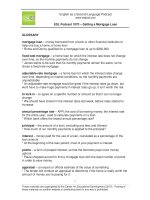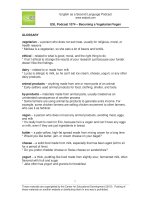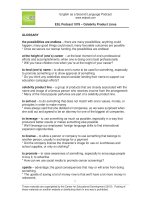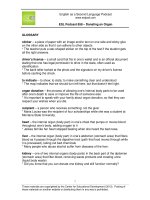ESL podcast 872 – a publicity stunt
Bạn đang xem bản rút gọn của tài liệu. Xem và tải ngay bản đầy đủ của tài liệu tại đây (86.69 KB, 9 trang )
English as a Second Language Podcast
www.eslpod.com
ESL Podcast 872 – A Publicity Stunt
GLOSSARY
costume – clothing and accessories worn to change one’s appearance so that
one appears to be another person, character, or object, especially for Halloween
* The children are going to be in a school play, but their parents have to make
the costumes.
publicity stunt – an action or event designed to gain attention from many people
and/or the media
* As a publicity stunt, the bakery has announced that it will bake the world’s
largest cake and then let visitors eat a piece of it for free.
to dress up as – to put on special clothing and accessories so that one appears
to be another person, character, or object
* Harold is going to dress up as an elephant for the costume party.
media coverage – a measure of the number of articles and news stories
reported in newspapers, magazines, television programs, and on the Internet
about a particular person, business, or event
* The event received a lot of media coverage last year, so we expect even more
people to attend this year.
grand opening – an event or celebration on the first day (or the first few days)
when a business opens, often with speeches and a party-like atmosphere
* During the grand opening of the grocery store, shoppers received a lot of free
samples and coupons.
to attract – to pull something toward oneself; to cause someone or something to
become interested in oneself and move toward oneself
* Yukihiro says that Judy’s eyes were what first attracted him to her.
attention – a measure of how much people are noticing someone or something
without being distracted by other things
* Students, please pay attention. This is important.
on hand – available and ready; present
* I don’t have enough cash on hand to pay for lunch. Could you please loan me a
few dollars?
1
These materials are copyrighted by the Center for Educational Development (2013). Posting of
these materials on another website or distributing them in any way is prohibited.
English as a Second Language Podcast
www.eslpod.com
ESL Podcast 872 – A Publicity Stunt
sound bite – a short section of an audio (and sometimes video) recording with
interesting information, repeated in news stories
* The news programs are all repeating the same sound bites from the candidate.
How can we find more detailed information about her ideas?
photo op – a photo opportunity; a situation or event that is attractive to
photographers and makes a business or individual look good
* Habitat for Humanity is an organization that builds homes for poor families, and
whenever they give the keys to new owners, there’s a great photo op.
to tie into – to connect or relate to; to be relevant to
* Jeremiah has an interesting idea for a new product, but it doesn’t really tie into
our other products.
marketing campaign – a coordinated, organized effort to make people more
familiar with a product or service, and to make them want to buy it
* Many sugary cereals use cartoon characters in their marketing campaigns to
appeal to young children.
along the lines of – similar to; related to; such as
* When you said you were a college student, I thought you’d be taking classes
along the lines of chemistry, history, and literature, not pottery and weight-lifting.
contest – a competition where people try to win something, sometimes based on
luck and sometimes based on skill or achievement
* The school is having a contest to see which child can guess how many candies
are in the jar.
giveaway – something that is given away to people for free, especially to
promote an organization or idea
* Inexpensive pens with logos are a great giveaway for banks and other financial
institutions.
media attention – articles and news stories reported in newspapers, magazines,
television programs, and the Internet about a person, business, or event
* Let’s make sure the CEO is comfortable speaking to reporters about the new
company changes before we get any more media attention.
to skydive – to jump out of an airplane with special equipment so slow down
one’s fall so that one can land safely
* Sharon is too scared to go skydiving, because she’s afraid the parachute won’t
open.
2
These materials are copyrighted by the Center for Educational Development (2013). Posting of
these materials on another website or distributing them in any way is prohibited.
English as a Second Language Podcast
www.eslpod.com
ESL Podcast 872 – A Publicity Stunt
COMPREHENSION QUESTIONS
1. What does Svetlana mean when she says, “I’ll be on hand to give sound
bites”?
a) She’ll be at the store to introduce the new managers.
b) She’ll be available to say interesting things to reporters.
c) She’ll be passing out free samples of banana-flavored products.
2.
a)
b)
c)
What is the person in the banana costume going to do?
Jump out of an airplane.
Leap high into the sky.
Dive into an outdoor swimming pool.
______________
WHAT ELSE DOES IT MEAN?
to dress up as
The phrase “to dress up as,” in this podcast, means to put on special clothing
and accessories so that one appears to be another person, character, or object:
“What are we supposed to wear to dress up as trees for the play?” The phrase
“to dress down” means to wear clothes that are less formal or not as nice as what
one normally wears: “Bank employees are allowed to dress down on Fridays, but
they aren’t allowed to wear shorts or sandals.” The phrase “to dress up” means
to wear clothes that are nicer than what one normally wears: “This is a fancy
restaurant, so please try to dress up.” Finally, the phrase “to dress (something)
up” means to make something appear nicer, more interesting, or more attractive
than it really is: “They dressed up the home with new paint and carpet, but they
couldn’t hide the structural problems.”
to tie into
In this podcast, the phrase “to tie into” means to connect or relate to, or to be
relevant to: “How does this assignment tie into what we’ve been learning in
class?” The phrase “to tie the knot” means to get married: “Jun and his wife tied
the knot when he was only 19 years old.” The phrase “to be tied up” means to be
very busy: “I’m sorry I couldn’t meet you for lunch, but I was tied up in meetings.”
Finally, the phrase “to tie up loose ends” means to do the final tasks needed to
finish a project: “The software engineers are tying up loose ends and plan to
have a finished product for your review by next Thursday.”
3
These materials are copyrighted by the Center for Educational Development (2013). Posting of
these materials on another website or distributing them in any way is prohibited.
English as a Second Language Podcast
www.eslpod.com
ESL Podcast 872 – A Publicity Stunt
CULTURE NOTE
Business Publicity Stunts
Businesses “engage in” (are involved in) many different types of publicity stunts
to gain media coverage and public attention for their businesses. Some publicity
stunts are “one-time” (happening only once) events, but other publicity stunts can
“take on a life of their own” (become a big, important thing that become greater
than planned).
For example, in 1903, a newspaper created a six-day “cycling” (bicycling race) all
around France. The race was supposed to encourage people to buy the
newspaper so that they could read the “results” (information about who won), but
the event took on a life of its own. Today, the race is known as the “Tour de
France” (a very famous cycling race in France that happens each year).
The Miss America “Pageant” (a contest to determine who is the most beautiful
and/or talented woman) was originally created as a way to bring more tourists to
Atlantic City, New Jersey, but the pageant became so popular that it is now an
annual event.
Other publicity stunts “live on” (continue to be active) only in our “collective”
(shared by many people) memory. For example, the fast food restaurant Taco
Bell announced on April 1, 1996, that it was purchasing the “Liberty Bell” (an
important historic monument; see English Café 375) and would rename it the
“Liberty Taco Bell.” Thousands of people called to “complain” (say negative
things) and then the company announced that it was a “hoax” (something done to
trick people) on “April Fool’s Day” (a day when people try to trick or fool each
other, on April 1 each year). The hoax increased the restaurants’ “revenue”
(income; money received) and people still “refer to it” (talk about it).
______________
Comprehension Questions Correct Answers: 1 – b; 2 – a
4
These materials are copyrighted by the Center for Educational Development (2013). Posting of
these materials on another website or distributing them in any way is prohibited.
English as a Second Language Podcast
www.eslpod.com
ESL Podcast 872 – A Publicity Stunt
COMPLETE TRANSCRIPT
Welcome to English as a Second Language Podcast number 872: A Publicity
Stunt
This is English as a Second Language Podcast episode 872. I’m your host, Dr.
Jeff McQuillan, coming to you from the Center for Educational Development in
beautiful Los Angeles, California.
Visit our website at ESLPod.com. Become a member of ESL Podcast and
download a Learning Guide for this episode.
This episode is a dialog between Hank and Svetlana about a publicity stunt,
about an attempt by a business to get people to pay attention to it. Let’s get
started.
[start of dialog]
Hank: What’s that for?
Svetlana: This costume? I’m planning a publicity stunt to get our store more
business.
Hank: You think that dressing up as a giant banana will get our store more
business?
Svetlana: We need to get media coverage for the grand opening of our store and
attract as much attention as possible. I’ll be on hand to give sound bites and
organize photo ops.
Hank: How does a giant banana tie into our store?
Svetlana: It doesn’t directly, but trust me, it’ll get noticed.
Hank: I was thinking of a traditional marketing campaign, more along the lines of
holding a contest or a giveaway. And I don’t see how a giant banana is going to
get media attention.
Svetlana: The person in the giant banana costume will skydive into the parking
lot of the store.
5
These materials are copyrighted by the Center for Educational Development (2013). Posting of
these materials on another website or distributing them in any way is prohibited.
English as a Second Language Podcast
www.eslpod.com
ESL Podcast 872 – A Publicity Stunt
Hank: What idiot have you convinced to do that?
Svetlana: Well, that’s actually why I’m here...
[end of dialog]
Hank begins by asking Svetlana, “What’s that for?” meaning “Why do you have
that?” Svetlana says, “This costume?” A “costume” (costume) refers to clothing
that you wear so that you look like a different person. People wear costumes, for
example, on Halloween. They dress up or they put on clothing to make them look
like someone else. Little children may put on costume to make them look like
Superman or someone from Star Wars. I don’t know. I don’t know what kids wear
nowadays for costumes at Halloween.
Svetlana says that she’s planning a publicity stunt “to get our stores more
business.” “Publicity” (publicity) is attention that you get, especially from
newspapers, magazines, radio stations, television stations, and so forth.
“Publicity” refers to attention you get from what we would call the “media”
(media), which refers to all the different ways people get their information.
Nowadays, that would include the Internet. A “stunt” (stunt) is some action or
some event that people do just to get attention. A “publicity stunt” is something a
business or a person would do so that everybody else pays attention to them.
Usually, it involves fooling or tricking people into believing something that isn’t
true. That doesn’t always happen but that’s one kind of publicity stunt.
Svetlana says she’s doing a publicity stunt “to get our store more business.”
“Business” here means more money, more people buying from us. Hank says,
“You think that dressing up as a giant banana will get our store more business?”
“To dress up as” means to wear a costume, to put on special clothing. The verb
“to dress up” usually means to put on nice clothes, like you’re going to a nice
dinner or a wedding, for example. “Dressing up as” means you’re putting on
clothes like a costume, to pretend like you are a different person.
Svetlana says, “We need to get media coverage for the grand opening of our
store and attract as much attention as possible.” “Media,” we’ve already talked
about, refers to television, newspapers, and so forth. “Coverage” (coverage)
means when these media sources – the newspapers, the magazines – write
stories or have stories about you on their programs. If someone says, “There
wasn’t a lot of coverage about the election this week,” they mean there weren’t
very many stories in the newspapers or in the magazines or on television about
that topic. “Coverage” refers to the amount that the news media is paying
attention and talking about something.
6
These materials are copyrighted by the Center for Educational Development (2013). Posting of
these materials on another website or distributing them in any way is prohibited.
English as a Second Language Podcast
www.eslpod.com
ESL Podcast 872 – A Publicity Stunt
A “grand opening” is a big celebration, a big event when a business opens up a
new store or simply opens up their first store. Grand openings often have some
sort of celebration attached to them or connected to them. Sometimes you’ll have
the mayor or the governor come to celebrate this opening of a new business or of
a new location for your business. Usually, the governor doesn’t come to those
sorts of things. Well, it’s possible.
Svetlana wants to get media coverage for the grand opening of their store and
attract as much attention as possible. “To attract” means to pull something
toward yourself or, more generally, to cause someone to become interested in
you. That’s why we have the adjective “attractive.” A woman who is attractive
attracts men. Men become interested in her and walk toward her and she, of
course, turns around and walks in the other direction. I guess that just happens
to me.
“Attention” (attention) is a measure of how much people are noticing someone or
something. How much people are focused on a certain thing or a certain person.
“To attract attention,” then, is to get people to pay attention, to look at you, to
notice what you are doing.
Svetlana says that she’ll be on hand to give “sound bites and organize photo
ops.” The expression “to be on hand” means to be present, to be there, to be
available and ready in case someone wants, in this case, to talk to you. It’s an
expression we would use mostly in business, talking about someone who is
going to be at a certain event.
A “sound bite” (bite) is a short phrase, sentence, or paragraph with some
interesting information that is used, typically, in a news story. You might have a
politician who wants to get attention and he knows that typically, on television,
you only have maybe 10 or 15 seconds. He will come up with some phrase,
some expression that people will remember that will summarize all of his ideas
and arguments. That’s what a sound bite is. It’s a short quote, really, from
someone about some situation in the news.
A “photo op” (op) is short for a “photo opportunity.” It’s a situation or an event that
photographers like to come to or people from television stations come to, to take
pictures of something. Here in Hollywood, in Los Angeles, every week there’s
typically a new movie that is opening and they have a celebration where they
invite photographers, television stations to come and take pictures of the stars of
the movie. This is a photo op – an opportunity for someone to have their
photograph taken.
7
These materials are copyrighted by the Center for Educational Development (2013). Posting of
these materials on another website or distributing them in any way is prohibited.
English as a Second Language Podcast
www.eslpod.com
ESL Podcast 872 – A Publicity Stunt
Hank says, “How does a giant banana tie in to our store?” Remember Svetlana is
going to dress up as a giant banana. Hank wants to know how this “ties into” their
store. “To tie (tie) into something” means to relate to, to be connected to
something. Svetlana says, “It doesn’t.” It does not tie into our store directly. “But
trust me, it’ll get noticed.” People will notice us.
Hank says, “I was thinking of a traditional marketing campaign, more along the
lines of holding a contest or a giveaway. And I don’t see how a giant banana is
going to get media attention.” A “marketing campaign” is an effort to get people
familiar with your product or your service. It’s a term we use in business to talk
about making people aware that you exist. “Along the lines of” is an expression
meaning related to or similar to. Hank was thinking of a traditional marketing
campaign, more along the lines of holding a contest or a giveaway. He wants a
marketing campaign that’s similar to something such as holding, or having a
contest or a giveaway. A “contest” is typically a competition where people try to
win something based either on luck or on something that they do. A “giveaway”
(giveaway) – one word – is a noun referring to something that people are given
for free, often by an organization that is trying to market their product or service,
to promote, to get people to pay attention to their product or service.
Hank says, “I don’t see how a giant banana is going to get media attention.”
“Media attention” is the same as publicity. Svetlana says, “The person in the
giant banana costume will skydive into the parking lot of the store.” “To skydive”
(skydive) means to jump out of an airplane and then with, what we would call a
“parachute,” to come down to the ground and land on the ground – without dying,
that’s the idea. The giant banana then, is going to jump out of an airplane. It’s
going to skydive into the parking lot of the store. That’s how Svetlana will get
people to pay attention to the giant banana.
Hank says, “What idiot have you convinced to do that?” He thinks this is a stupid
idea and only a stupid person would agree to do it. Svetlana says, “Well, that’s
actually why I’m here.” What she’s saying is that she wants Hank to be the
person who dresses up in the giant banana and dives out of the plane – skydives
out of the plane.
Now let’s listen to the dialog this time, at a normal speed.
[start of dialog]
Hank: What’s that for?
8
These materials are copyrighted by the Center for Educational Development (2013). Posting of
these materials on another website or distributing them in any way is prohibited.
English as a Second Language Podcast
www.eslpod.com
ESL Podcast 872 – A Publicity Stunt
Svetlana: This costume? I’m planning a publicity stunt to get our store more
business.
Hank: You think that dressing up as a giant banana will get our store more
business?
Svetlana: We need to get media coverage for the grand opening of our store and
attract as much attention as possible. I’ll be on hand to give sound bites and
organize photo ops.
Hank: How does a giant banana tie into our store?
Svetlana: It doesn’t directly, but trust me, it’ll get noticed.
Hank: I was thinking of a traditional marketing campaign, more along the lines of
holding a contest or a giveaway. And I don’t see how a giant banana is going to
get media attention.
Svetlana: The person in the giant banana costume will skydive into the parking
lot of the store.
Hank: What idiot have you convinced to do that?
Svetlana: Well, that’s actually why I’m here...
[end of dialog]
She doesn’t get the attention that she deserves. I speak of our wonderful
scriptwriter, Dr. Lucy Tse. Thank you Lucy.
From Los Angeles, California, I’m Jeff McQuillan, thank you for listening. Come
back and listen to us again, right here on ESL Podcast.
English as a Second Language Podcast is written and produced by Dr. Lucy Tse,
hosted by Dr. Jeff McQuillan. Copyright 2013 by the Center for Educational
Development.
9
These materials are copyrighted by the Center for Educational Development (2013). Posting of
these materials on another website or distributing them in any way is prohibited.









